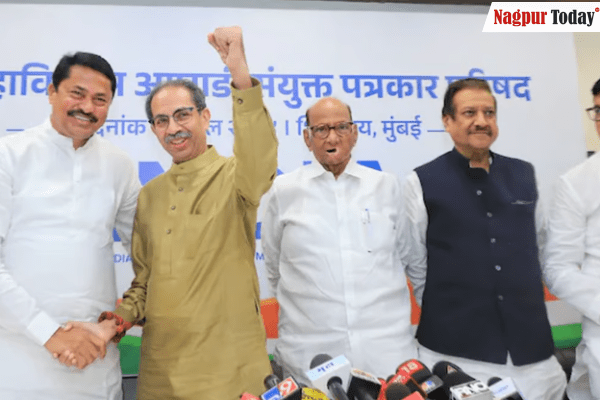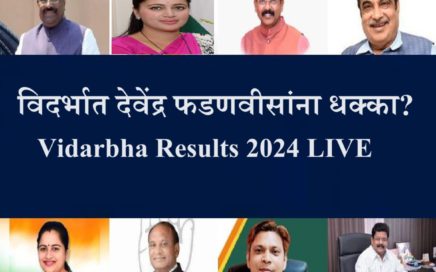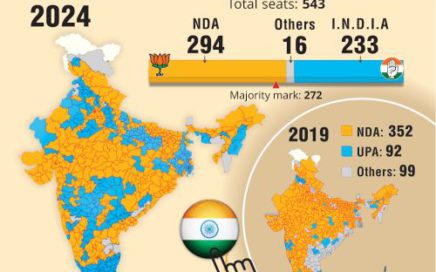
Mumbai/Nagpur:The Maharashtra Vikas Aghadi (MVA) alliance, consisting of the Congress, Shiv Sena (Uddhav Thackeray faction), and the Nationalist Congress Party (NCP) led by Sharad Pawar, has made significant gains in the recent Maharashtra elections. This coalition’s success was particularly notable in the Vidarbha and Western Maharashtra regions.
Key Victories and Strategic Wins
One of the highlights for the MVA was the victory in the Baramati seat, a stronghold of the Pawar family. Supriya Sule, daughter of Sharad Pawar, managed to secure the seat against her cousin Ajit Pawar’s wife, despite Baramati experiencing the lowest voter turnout in the state.
The Congress President, Mallikarjun Kharge, had boldly predicted that the MVA would win 46 of the 48 seats in Maharashtra. While the final tally was lower, with the MVA securing 30 seats compared to 17 for the Mahayuti alliance, it still represents a significant improvement given the defections and splits the MVA had faced.
Feathers in the Cap
The MVA’s victories in Mumbai were particularly noteworthy. Anil Desai of the Uddhav Thackeray faction of Shiv Sena won the Mumbai South Central seat against significant odds. Additionally, the Mumbai North East seat was another win for this faction, while the BJP only managed to clinch the Mumbai North seat through Piyush Goyal.
Ravindra Waikar of the Eknath Shinde faction of Shiv Sena narrowly won the Mumbai North West constituency by defeating Uddhav Thackeray’s candidate, Amol Kirtikar, by just 48 votes. High-profile losses included Ujwal Nikam, who was defeated by Congress’ Varsha Gaikwad in Mumbai North Central.
Regional Dynamics
In Vidarbha, Congress made substantial gains, unseating top state-level leaders like Sudhir Mungantiwar. Congress leader Anees Ahmad expressed confidence in replicating these results in the upcoming assembly elections.
In contrast, the All India Majlis-e-Ittehadul Muslimeen (AIMIM), which had previously won a seat in Aurangabad, failed to secure any seats this time.
Reactions and Future Challenges
Outgoing Union minister Ramdas Athawale of the BJP’s alliance partner, Republican Party of India, acknowledged the results, attributing the MVA’s success to the popularity of Uddhav Thackeray and Sharad Pawar. Athawale suggested that the perception of BJP’s role in splitting Shiv Sena and NCP might have influenced voters’ preferences.
The Mahayuti, consisting of the Eknath Shinde faction of Shiv Sena, BJP, and the NCP’s breakaway faction, faces the challenge of consolidating its base for the assembly elections. Political analyst Vijay Jawandhia highlighted that in Vidarbha, farmer suicides were a major issue, but the Mahayuti’s focus remained more on caste-based appeals.
Assembly Election Outlook
As the assembly elections approach, the MVA aims to consolidate its gains, while the Mahayuti seeks to reclaim lost ground. In Western Maharashtra, the contentious issue of affirmative action and the Maratha reservation movement will likely dominate the political landscape.
Former Union minister Prakash Javadekar rationalized the BJP’s setback, attributing it to the aftermath of the Shiv Sena (Uddhav faction) joining the MVA. On the other hand, MVA leaders remain optimistic. Former Chief Minister Prithviraj Chavan believes the Lok Sabha victory will translate into similar success in the assembly elections, driven by seamless teamwork within the MVA.
The political landscape in Maharashtra is set for an intense battle as both alliances gear up for the assembly polls, with the MVA buoyed by its recent successes and the Mahayuti strategizing to regain voter confidence.
















